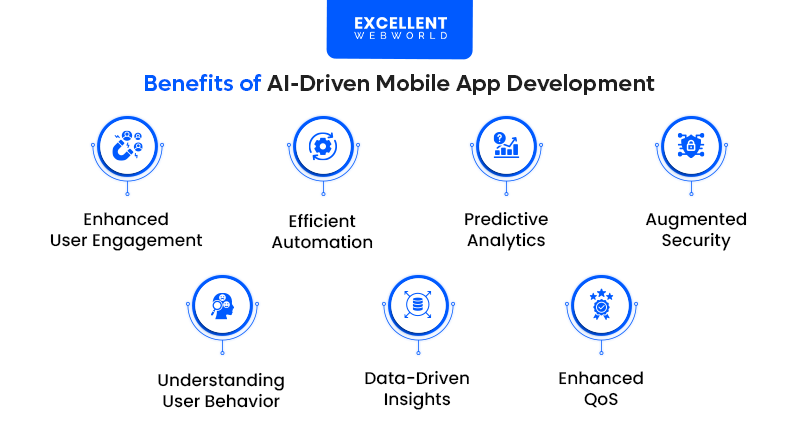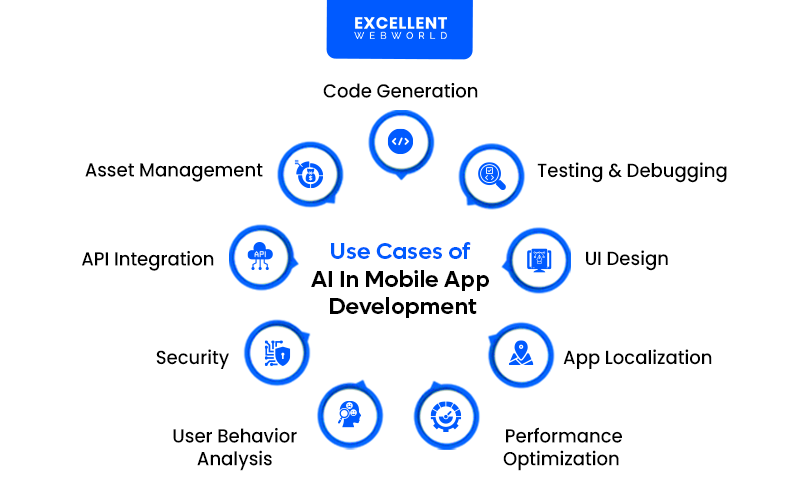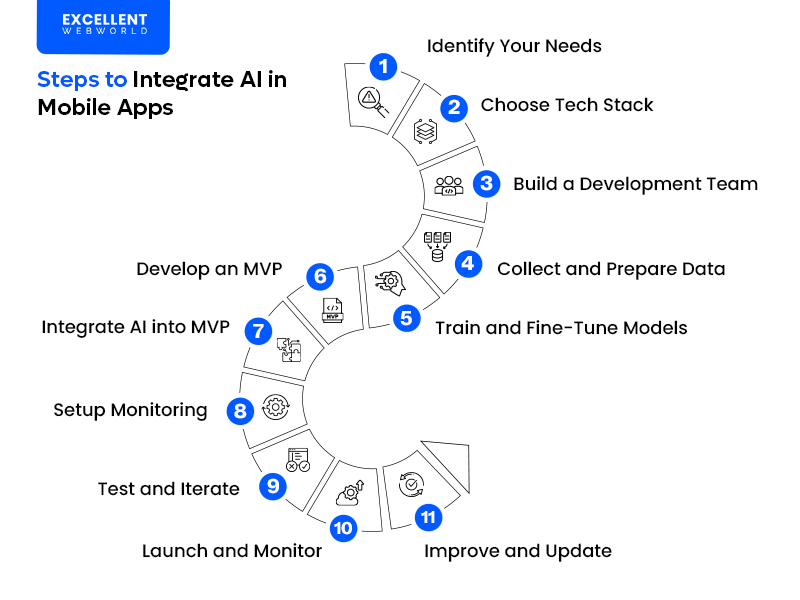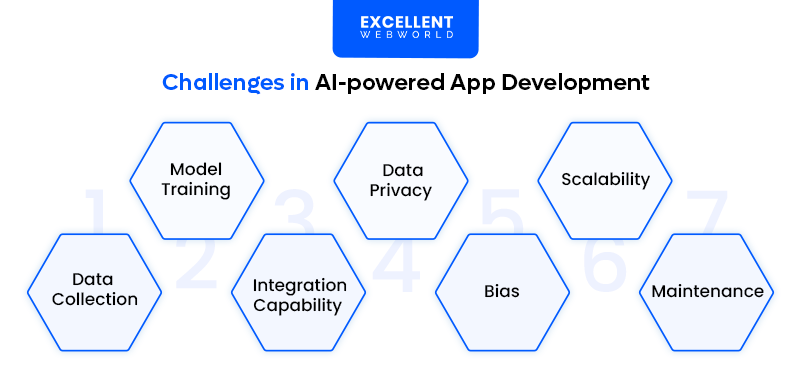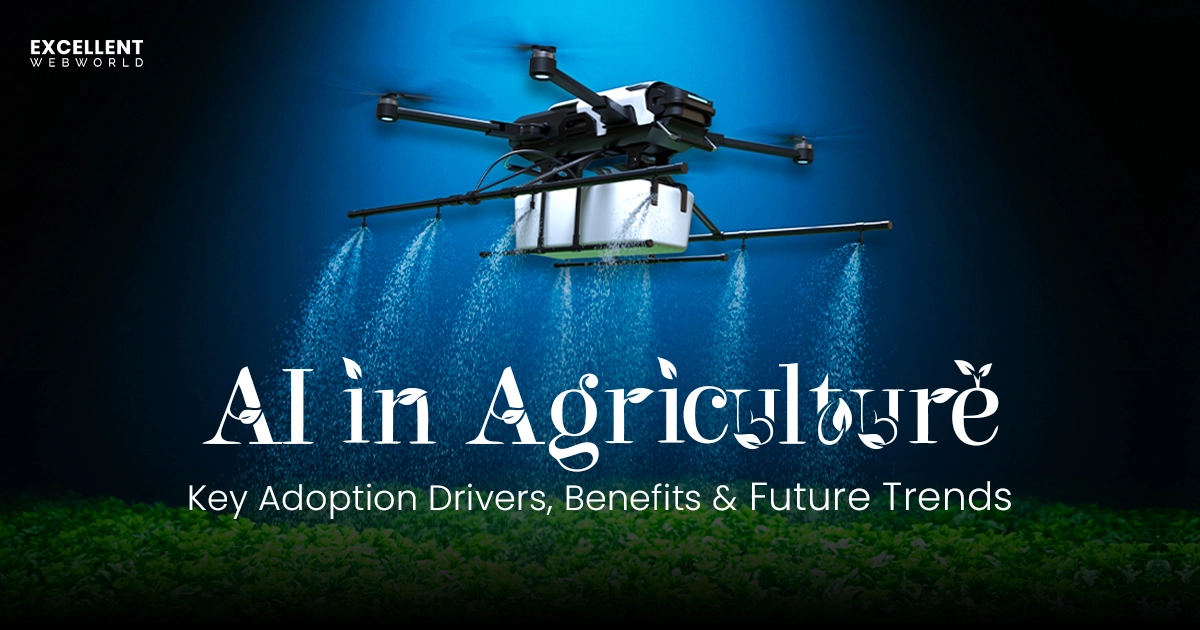The mobile app development landscape is transforming rapidly, with AI tools cutting development time by up to 50% (Source: PwC) and over 76% of developers now leveraging AI for coding. (Source: Stack Overflow) This technological shift is turning month-long projects into week-long achievements.
Forward-thinking businesses aren’t merely exploring AI-powered digital product design to developmen – they’re thriving with it. The rise of edge applications and the adoption of no-code platforms demonstrate the effectiveness of this evolution.
Vibe Coding represents the next frontier in artificial intelligence app development, with Google’s Firebase Studio at the forefront of innovation. This intuitive tool anticipates needs by analyzing project patterns, serving as your coding partner, and enabling teams to complete complex projects more efficiently with fewer iterations.
The message is clear: AI in mobile app development has shifted from optional to essential for market success. Our guide provides practical steps to implement app development solutions that effectively leverage AI, helping you identify ideal use cases and maintain a competitive advantage in today’s innovation-driven landscape.
Prefer listening? The podcast below covers the same key insights and strategies from this article, so you can choose your favorite way to explore how AI is shaping mobile app development.
Understanding AI Fundamentals for Mobile App Development
Before integrating AI into mobile app development, it’s essential to understand the basics of AI and its role in app development.
What is Artificial Intelligence (AI)?
Artificial Intelligence (AI) enables machines to simulate human intelligence by learning, reasoning, and solving problems independently.
Artificial intelligence in mobile app development enables the creation of more intuitive and personalized experiences. For example, when you operate Instagram’s filters or Snapchat’s face results that tune and transform your functions in real-time, you are experiencing AI in app development at work.
What Does AI in Mobile App Development Mean?
AI in mobile apps refers to the integration of intelligent algorithms that enable apps to learn, adapt, and perform tasks without explicit programming.
For example, your health app may utilize artificial intelligence in mobile apps to analyze exercise patterns and suggest personalized routines. It transforms how you interact with your device, making apps more innovative and responsive. This reflects the growing impact of AI in healthcare app development, where intelligent features make apps more innovative and responsive.
Another example is using AI in procurement, where you can leverage data-driven insights provided by algorithms to make smarter purchase decisions. Understanding what AI brings to mobile app development sets the stage for exploring how specific AI technologies drive this transformation. Let’s explore the key innovations transforming mobile experiences.
AI Technologies Transforming Mobile App Development
Integrating artificial intelligence in mobile applications revolutionizes how we interact with our devices. As those technologies mature, they create remarkable possibilities for building innovative, intuitive, and noticeably personalized experiences.
| AI Technologies | How does it Transform Mobile Apps? |
|---|---|
| Natural Language Processing (NLP) | Enables apps to understand and interpret human language, powering intelligent search, content categorization, and sentiment analysis |
| Machine Learning | Creates personalized experiences by analyzing user behavior patterns, enabling predictive text, content recommendations, and adaptive interfaces |
| Emotion Recognition | Detects user emotions via facial expressions or voice tones to deliver contextually suitable responses and enhance user engagement |
| Chatbots | Provide 24/7 automatic customer service & support, navigate customers through app capabilities, and handle recurring inquiries without human intervention |
| Computer Vision | Powers image recognition, AR features, visual search, facial authentication, and real-world object identification capabilities |
| Speech Recognition | Transforms voice instructions into textual content, allowing hands-free operation and accessibility functions for numerous users |
| Natural Language Generation (NLG) | Converts data into humanized textual content for automatic content creation, reporting, and personalized messaging |
| Large Language Models (LLM) | Enhance text processing capabilities for sophisticated content creation, summarization, and contextual understanding |
| Generative AI | Creates original content, including images, text, and audio, based on user action/prompts or app requirements, making it a key part of innovative generative AI use cases in software development. |
| Deep Learning | Powers complicated pattern recognition for advanced functions like real-time language translation, predictive analytics, and intelligent automation |
When implementing these technologies, consulting with AI experts guarantees that you maximize their capabilities. We’re a leading app development company that enables you to strategically leverage AI skills to create exclusive, powerful mobile experiences that will undoubtedly resonate with your customers.
As AI technology revolutionizes mobile apps, it is essential to recognize the tangible benefits they bring. Let’s explore the benefits of integrating AI into mobile app development and how these custom-built software solution brings rich rewards,
Key Benefits of AI in Mobile App Development
Artificial intelligence application development has emerged as a state-of-the-art approach, transforming everyday apps into progressive, responsive tools that genuinely apprehend user desires.
Here are the significant advantages of using AI in mobile app development:
1. Enhanced User Engagement with AI-Powered Apps
AI-powered personalization creates tailored stories that keep your target audience coming back. Your app can examine preferences and make relevant suggestions, notably increasing retention rates and dwell time. By delivering content and functions that align with individual user interests, you create a compelling reason for users to continue utilizing the app persistently.
2. Efficient Automation in Mobile Applications Using AI
Automating repetitive tasks through AI streamlines the mobile app development process. It reduces development time and operational cost, allowing your team to focus on innovation instead of maintenance duties.
3. Predictive Analytics for Personalized Mobile App Experiences
AI algorithms can analyze patterns and predict consumer behavior, helping you anticipate needs earlier than they arise. This forward-thinking approach is crucial in today’s end-to-end app development landscape, enabling proactive feature development rather than reactive updates.
4. Augmented Security with AI in Mobile Apps
Implementing AI-based security capabilities, such as facial recognition and anomaly detection, offers stronger protection against rising threats, making your AI and mobile apps more trustworthy to customers who increasingly prioritize data privacy and security.
5. Improved Understanding of User Behavior through AI
AI tools examine how users interact with your apps, offering insights that would be impossible to gather manually. This profound know-how is one of the key benefits of AI in eCommerce, as it drives more powerful updates and capabilities, from personalizing product recommendations to optimizing inventory management, that are tailored to user behavior.
6. Data-Driven Insights for Mobile App Optimization
Transform extensive datasets into actionable intelligence that informs strategic decisions at some point in the fullcycle app development journey, ensuring resources are allocated to capabilities that deliver the most value for app users.
7. Enhanced Quality of Service with AI Integration
AI continuously analyzes overall app performance, addressing problems before customers observe them. It provides a terrific experience that builds consumer trust and loyalty over time.
Understanding AI’s advantages sets the foundation. Let’s explore how these benefits are applied in real-world scenarios through impactful use cases in mobile app development.
Top Use Cases of AI in Mobile App Development
As smartphones become increasingly more effective, developers are leveraging artificial intelligence to build even more revolutionary apps that can analyze user behavior and adapt accordingly.
Here are the diverse use cases of AI in mobile app development:
Business Use Cases for AI in Mobile App Development
1. AI-Driven Code Generation for Mobile Apps
Automated app development tools can now generate code snippets or features based on simple descriptions. It reduces development time and mistakes, allowing developers to focus on more complicated project elements.
2. Automated Testing and Debugging with AI
AI systems can automatically discover bugs and vulnerabilities by studying code patterns. These tools can run hundreds of test case scenarios in minutes, highlighting problems that could take human testers days to learn and implement.
3. AI-Powered User Interface (UI) Design
AI-based app development platforms can generate UI features and display layouts based on best practices and personal preferences. It helps create intuitive interfaces that adapt to a user’s behavior.
4. Mobile App Localization Using AI
Natural Language Processing enables accurate translation and cultural adaptation of your app. This technology helps you expand globally without losing meaning or cultural context in different markets.
5. Performance Optimization with AI in Apps
AI algorithms can analyze app performance metrics and propose optimizations for velocity and resource usage. As a custom application development company, we can help you create lighter, faster apps that conserve battery life.
6. Advanced App Security through AI
Machine learning models can detect unusual patterns that indicate security threats, protect user data, and maintain privacy compliance across different regions.
7. User Behavior Analysis Using AI Algorithms
By studying how customers interact with your app, AI can identify pain points and opportunities for improvement, helping you understand how to leverage AI in mobile apps to enhance user satisfaction.
8. Seamless API Integration with AI
AI tools can streamline the connection to third-party services, automatically map data fields, and suggest optimal integration paths.
9. Asset Management in Mobile Apps with AI
AI systems can optimize image compression, control design assets, and ensure consistent branding throughout the app. It is essential when building an AI app that maintains visual coherence while minimizing file sizes.
Industry-Specific Use Cases of AI in Mobile App Development
Having seen how AI complements mobile apps through real-world use cases, it’s time to discover how you can bring these ideas to life with a clear, step-by-step integration manual.
Step-by-Step Process to Integrate AI in Mobile Apps
As mobile app development trends evolve, integrating AI abilities requires a methodical approach that balances innovation with practicality. Here are the steps you may follow to integrate AI in mobile apps:
Step 1: Identify Business Needs for AI in Your App
Before starting app & software development projects for AI, define the business problem that AI can solve in your application.
Ask yourself:
This crucial first step in artificial intelligence for app development sets the foundation for everything that follows. Document your requirements well and set measurable goals that will help you examine success later.
Step 2: Choose the Right AI Tech Stack
Creating your AI ecosystem requires carefully selecting technologies that align with your goals.
Consider:
Your selected tech stack will substantially impact the development speed, performance, and maintenance requirements of your digital products. Make these choices cautiously, consulting with professionals if necessary.
Step 3: Build a Skilled AI App Development Team
Successful AI integration demands specialized expertise.
Your mobile app development team for AI integration should include the following:
If in-house talent is limited, consider partnering with skilled AI app developers or connecting with an AI development company that has a proven track record in building custom solutions for AI-based projects.
Step 4: Collect and Prepare Data for AI Models
AI models are only as good as the data on which they are trained.
This stage involves:
The data preparation phase often consumes 60-80% of an AI project’s timeline, but pays dividends in model accuracy and performance.
If you prefer not to manage these tasks, consider hiring dedicated software developers from us who possess the skills and expertise to develop cutting-edge AI solutions.
Step 5: Train and Fine-Tune AI Models
With your data prepared, you can now:
This iterative process is at the heart of AI/machine learning app development, requiring patience and expertise to develop AI that performs reliably in real-world conditions rather than just controlled environments.
Step 6: Develop a Minimum Viable Product (MVP) with AI
Before full-scale implementation, build a minimum viable product that:
Your MVP should embody the essential aspects of your cutting-edge digital solutions and services, while remaining lean enough to facilitate quick adjustments.
Step 7: Integrate AI Model into MVP
This technical step involves:
Proper integration requires careful attention to how the AI components interact with the broader application architecture.
Step 8: Establish AI Monitoring and Analytics Systems
Build robust monitoring capabilities to:
Proper monitoring provides visibility into how your AI features perform with real users and data.
Step 9: Test, Iterate, and Optimize AI Features
Comprehensive testing is crucial for AI mobile app development success:
Use testing insights to refine your AI models and the surrounding application features. The reason behind that is that AI models are the heart and soul of the entire ecosystem, based on which you can establish the next-gen AI agent development process. Therefore, ensure the model operates effectively and without bias.
Step 10: Launch and Monitor Your AI-Powered Mobile App
When deploying your AI-enhanced app:
The launch phase is not the end, but rather the beginning of learning how your AI performs in the real world.
Step 11: Continuously Improve and Update AI Capabilities
AI integration is never truly complete. Plan for continuous improvement by:
This AI-powered mobile app development guide simplifies integration for businesses. Follow our straightforward approach to seamlessly incorporate artificial intelligence features while avoiding common technical pitfalls and unnecessary complexity. Let’s explore the technical challenges in the upcoming section.
Challenges in AI-Powered Mobile App Development
While AI integration in mobile apps offers impressive capabilities, it presents specific hurdles you must navigate. Understanding those challenges is vital for teams seeking to mitigate modern business challenges with a digital-first approach while providing reliable, ethical, scalable, and cutting-edge software solutions.
1. Data Collection and Management for AI Apps
Gathering enough high-quality data remains one of the significant barriers to AI development. AI models cannot learn efficaciously without proper information or produce correct consequences.
Pro Tip: Implement a comprehensive data strategy before starting end-to-end software development. Consider using synthetic data generation techniques when real data is limited, or establish partnerships to enhance your training datasets.
2. Training and Scaling AI Models in Mobile Apps
Training AI models and achieving a certain proficiency level requires extensive computational resources and subject-matter expertise, which startup or small business development teams may lack.
Pro Tip: Use ready-to-use models and fine-tune them for your specific use case. This technique dramatically reduces the assets required while preserving the quality of your mobile app intelligence features.
3. Integration Capability of AI Solutions
Integrating AI components with existing app architecture can create compatibility troubles and performance bottlenecks.
Pro Tip: Design your application with modular architecture patterns that enable independent upgrades of AI components. To simplify implementation, consider using an API-based integration for specific AI functionalities.
4. Ensuring Data Privacy in AI Mobile Apps
An AI native app requires access to sensitive client information, which raises concerns about privacy and compliance with regulatory requirements.
Pro Tip: Enforce privacy-by-design principles and explore methodologies such as federated learning, which enables apps that utilize artificial intelligence to analyze non-public data without transferring it to central servers.
5. Addressing Bias in AI Algorithms
Bias is a company’s most significant problem when using AI models. If your training data contains biases, it can lead to discriminatory effects, eroding the purchaser’s trust and negatively impacting brand recognition.
Pro Tip: Establish diverse development teams and implement bias detection tools throughout the AI development process. Regularly audit your AI systems for potential bias issues after deployment to ensure optimal performance and reliability.
6. Scalability of AI-Driven Mobile Apps
AI systems must handle increasing loads as user bases grow without performance degradation or rising costs.
Pro Tip: Design your AI architecture with horizontal scaling capabilities. For mobile artificial intelligence projects, consider cloud-based processing for extensive tasks while keeping lightweight inference on the device.
7. Maintenance and Upgrades for AI Apps
AI systems require continuous monitoring, retraining, and updating to remain powerful as user behaviors and environments evolve.
Pro Tip: Build telemetry into your AI components to monitor overall performance and accuracy metrics. You can outsource mobile app development and maintenance to specialized groups that provide dedicated ongoing support.
While the challenges in AI-powered app development are considerable, many corporations have successfully overcome them. Let’s explore real-world case studies that highlight successful AI integration in widely used applications.
Case Studies: Successful AI Integration in Popular Mobile Apps
1. Netflix
Netflix is one of the most popular streaming apps, with a vast library of award-winning movies, TV shows, documentaries, anime, and more. It can be streamed from an app on devices like mobile phones, tablets, laptops, TVs, gaming consoles, and set-top boxes with an internet connection.
Usage of AI in Netflix Mobile App:
2. Instagram
It is a free social media platform that allows users to share their photos and videos with their online followers. Instagram is an app that has become popular for interacting with celebrities, brands, and friends. Its user-friendly interface and creative features, such as stories, reels, and filters, make it a platform for visual storytelling and personal expression.
Usage of AI in Instagram Mobile App:
3. Uber
Uber is a global ride-sharing and transportation platform that connects passengers with drivers through a mobile app. Users can request rides, track driver’s arrival, and make cashless payments for convenient transportation. Uber has revolutionized the way people travel by offering reliable and accessible transportation services.
Usage of AI in Uber Mobile App:
See Also: How To Build An App Like Uber?
Seeing how popular apps have efficaciously incorporated AI is inspiring; however, what does it take to construct something comparable? Let’s break down the Android app development cost and the iOS app development cost of building your AI-powered mobile app from scratch.
How Much Does it Cost to Develop AI Mobile Apps?
Cost to build an app can vary depending on several factors, like design requirements, the complexity of features, development time, and the location and expertise of the development team.
An MVP—a basic AI-based application with limited features—may cost anywhere between $18K and $20K. At the same time, a more advanced version with complex functionalities and integrations can range from $75,000 to $150,000 or even more. However, for already existing apps, an AI integration can go from $25/hr to $30/hr based on the requirements. Knowing the factors that influence AI app development costs is essential for a clearer understanding.
It is important to consider ongoing maintenance, updates, and security expenses. Working with a skilled development team and conducting a thorough analysis of AI development costs will help you determine an accurate budget for AI in mobile app development.
Future Trends of AI in Mobile App Development (2026 & Beyond)
The landscape of mobile app development continues to change swiftly, with artificial intelligence driving the next wave of innovation. Numerous emerging developments promise to transform users’ interactions with mobile apps.
How We Can Help You Build an AI-Driven Mobile App?
It may seem challenging to integrate Artificial Intelligence into your mobile application, but partnering with the right company, such as Excellent Webworld, a full-cycle web and mobile application development firm, can make it an exciting and rewarding venture. We specialize in demystifying the complexities of AI and provide you with a tailored solution to make your app AI-ready.
Our efficient AI developer team understands that one size does not fit all in the AI world. They approach each project with caution, tailoring a strategy to meet its specific needs. By collaborating closely with your business, we understand your exact requirements and seamlessly integrate AI into your app’s functionality. We have experience providing services to funded startups, established brands, small to medium-sized businesses (SMBs), enterprises, and the government.
With us, your app isn’t just technologically equipped for the future of AI but is positioned for growth, efficiency, and competitiveness.
Trust Excellent Webworld to be your partner; contact us now!

Article By
Paresh Sagar is the CEO of Excellent Webworld. He firmly believes in using technology to solve challenges. His dedication and attention to detail make him an expert in helping startups in different industries digitalize their businesses globally.

